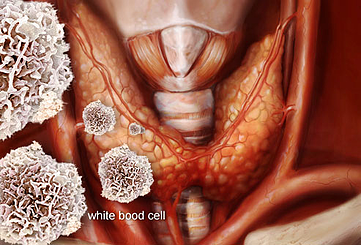
Healthy Thyroid Function, Part 5

In the United States the most common cause of hypothyroidism is Hashimoto's autoimmune thyroid. An autoimmune condition is an immunological response of the body against its own tissue and organs. Named after the scientist who first identified this condition, Hashimoto's involves a progressive attack of the thyroid gland by the immune system.
Hashimoto's Thyroiditis
The slow and gradual attack on the thyroid gland by immune cells eventually destroys enough tissue of the gland that it stops producing enough of its hormones. This causes the pituitary to release more thyroid stimulating hormone and can be seen as elevated TSH levels in the blood. This process can take many years and will often go undiagnosed until a large portion of the thyroid tissue has been destroyed.
It is common to suffer the symptoms of Hashimoto's for years before a diagnosis is made and treatment prescribed. As with other autoimmune conditions, Hashimoto's comes in waves or flareups. This is part of the reason it is difficult to pinpoint the condition. If testing takes place flareups, blood tests may not reveal the necessary markers for a diagnosis.
The symptoms of Hashimoto's thyroiditis are most often the same as those of hypothyroidism (slow thyroid). However, as destruction of the gland progresses, it is possible to suffer the symptoms of hyperthyroidism (fast thyroid) as well. Grave's Disease is another form of autoimmune thyroid that only expresses itself as hyperthyroidism. But Hashimoto's can exhibit both.
How to Identify Hashimoto's
Most medical checkups include a thyroid test. But typically the test is only for TSH levels. TSH levels may or may not be elevated with autoimmune thyroid. It is ideal to have a more comprehensive thyroid panel that includes, Total T4, Total T3, T3 uptake and thyroid antibodies known as TPO and thyroglobulin AB. It is safe to assume if thyroid antibodies are elevated significantly that there is an autoimmune response present. If allowed to persist this will usually develop into an advanced case of Hashimoto's. Traditional physicians may not diagnose Hashimoto's simply with elevated antibodies, but a functional medicine doctor may treat it at this point as a means of preventing destruction of this important gland.
Gluten and Hashimoto's
Scientific evidence has uncovered a strong correlation between autoimmune thyroid and gluten sensitivity. The gliadin molecule found in gluten that causes the greatest reactions in the gluten sensitive is molecularly similar to the tissue of the thyroid. Thus when gluten enters the system and causes an immune response, the immune system mistakes the thyroid for the true culprit - gluten. For this reason it is highly recommended that those with autoimmune thyroid conditions be tested for gluten sensitivity. It is also highly advised to avoid gluten indefinitely.
Hashimoto's Thyroiditis is a complicated autoimmune condition that requires the assistance of a trained professional that understands autoimmunity. With the help of diet, lifestyle changes and immune modulating botanicals it is possible to better manage the frequency and severity of flareups with the hopes of preventing extensive damage to the organ and its life altering consequences.
Read the other articles in the Healthy Thyroid Function series.


